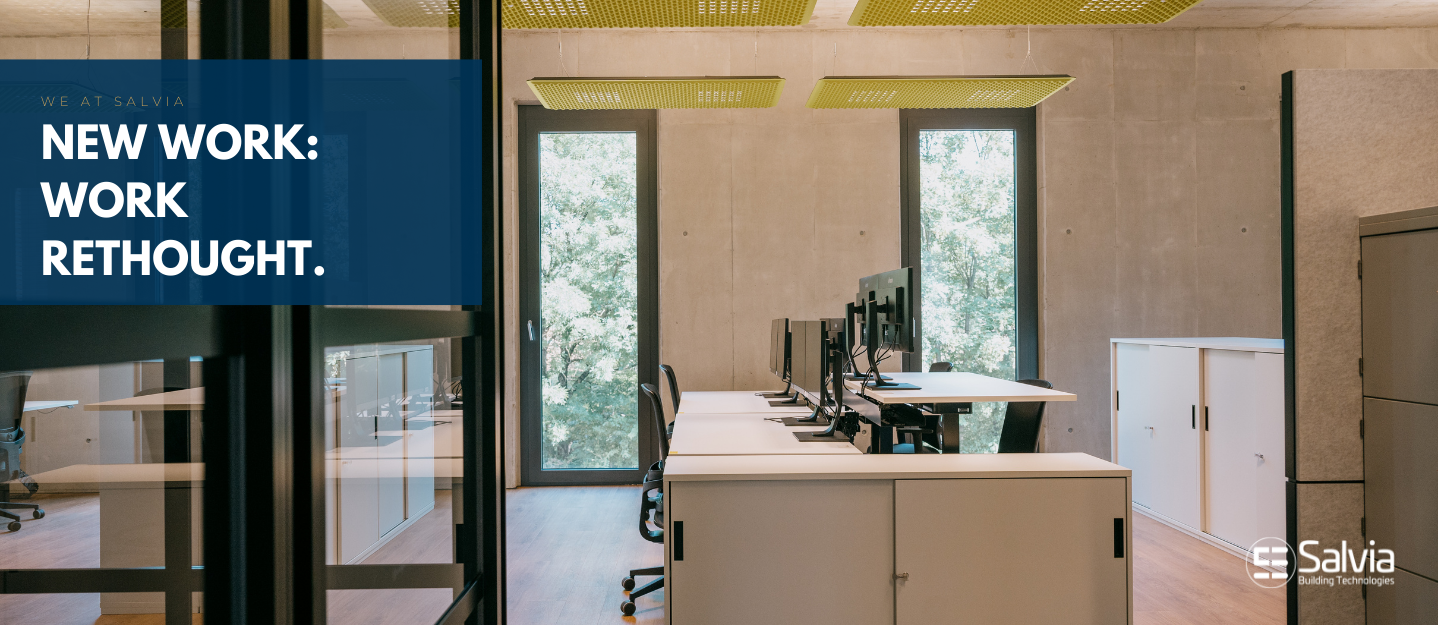Trust, flexibility, motivation, innovation, humanity, resilience - these are THE terms when it comes to describing the "New Work" of the working world 4.0. New Work refers to the structural change in work set off by digitalisation and globalisation.
As for Salvia building technologies, we have long recognised that companies must adapt to the changes in society and the world of work. Since the beginning of the Corona pandemic, a changing our way of working was vital.
Structural change: What does New Work mean?
New Work is the generic term for all new forms of work that have developed over the last decades of digitalisation and globalisation. It describes the way of working today and aims to promote and support flexibility and individuality in the company. The approach is to combine professional development with personal fulfilment. That is implemented by placing employees at the centre and generally giving them more personal responsibility to develop their full potential.
Well-known forms of the New Work are the home office, co-working spaces, flexitime or sabbaticals - forms of work that enable an adequate work-life balance and allow employees to organise their working day flexibly.
How do you actively implement New Work in your company?
New Work requires rethinking in all layers of the company. Hierarchies ought to be flattened, the focus must be placed on the employees, and their potential is to be fostered. Independent creative work is encouraged and should replace the sole following of instructions by managers. Fixed workplaces are also losing importance; concepts such as desk sharing and mobile working are to replace fixed office workplaces. There should no longer be a professional separation of workgroups, but only mixed teams.
The awareness that work and personal freedom do not contradict each other must be developed and internalised by both managers and employees. This way, New Work can be successfully implemented.
Therefore, companies have to fulfil particular requirements to be able to establish New Work:
- Every employee must be reachable on a mobile basis, i.e. a company phone or a company laptop must be provided for them. It must be possible to participate in digital conferences, and it must be possible to connect to the company network at any time in any place without risks..
- Smart office concepts must be realized.
- Agile working methods are applied, i.e. the project teams are in charge, and the management only assists them in an advisory capacity.
- Employees must be trained in the new way of working.
- An appropriate management style must be adopted (flat hierarchies and freedom, managers as inspiring and motivating coaches).
- There must be transparent communication.
If these prerequisites are met, the establishment of the New Work culture is unfortunately not possible overnight. Employees need time to get used to their new way of working, and managers must learn to trust their employees more.
What is the benefit of the implementation?
There are almost only advantages to implementing New Work if it is done in the right way. For example, employees who have to travel a long way can save themselves the trouble by working from home. In addition, flexible working enables a better work-life balance, which is an enormous advantage, especially for employees with children. Open space offices also make networking much easier and faster. The flat hierarchies and the freedom to make your own decisions lead to more motivation and create space for creativity, innovation, and productivity.
If New Wok is implemented too quickly, without a period of acclimatisation, it can have the opposite effect. Workers who have not yet developed sufficiently good self-management and time management end up in a vicious circle of excessive demands. Likewise, the lack of separation between work and private life can lead to humility for some. Digital and location-independent work also require technical skills that older generations often lack.
New Work at Salvia Building Technologies
When we moved into our administrative headquarters in Eislingen, we moved into a building that was intentionally designed for New Work. Open space-like office areas and the work café promote networking. If you need some peace and quiet, you can retreat to an individual office or one of the think tanks. The possibility of working from the home office brought us advantages both during the Corona pandemic and afterwards, as we were able to implement hygiene measures in the building much more efficiently through the home office and realised that hybrid working methods work for us.
Nevertheless, our New Work journey does not end here. Our management and staff regularly receive further training in this regard - in keeping with the motto: "You never stop learning".

